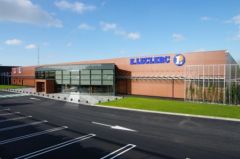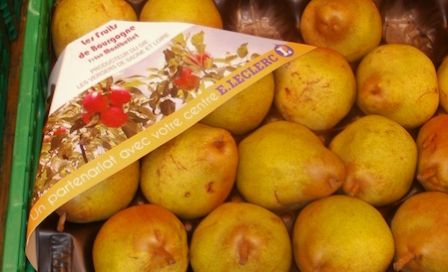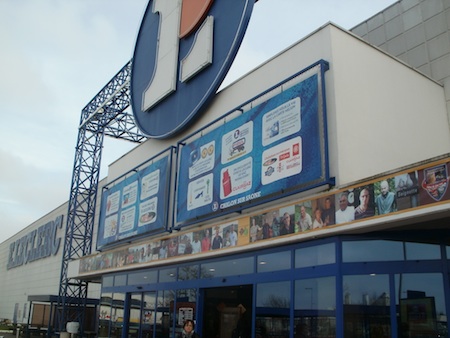E.Leclerc: an ethical hypermarket chain?
By Brook Lowry Rivet on Tuesday, December 11 2012, 15:53 - Permalink

The first Leclerc "Distribution Center"
in Landerneau, Brittany in 1959 (above)
and modern store (below right)

Edouard Leclerc died at age 85 on September 17, 2012. According to the (false) urban legend about George W Bush, the French don't have a word for "Entrepreneur." Maybe "Leclerc" would be a good translation. He invented a radical form of the modern hypermarket, beginning with a small grocery outlet in Brittany in 1949. Leclerc created not just the most important supermarket chain in France; he built an innovative business model based on revolutionary political and religious ideas that ultimately, changed the social landscape of a nation. He created a supermarket chain that is not a corporation but a semi-franchised, vertically integrated cooperative. His business model includes a charter which members must sign, swearing to uphold values and ethics, like some secretive, militaristic religious organization. The "Leclerc Movement" is both unique and radical; a set of ethics behind a massive business venture. Leclerc and his family only own 2 of the 686 stores in France, Italy, Spain and Portugal; the stores are independantly-owned franchises that "adhere" to his movement. While all of this sounds very strange to Americans, it makes perfect sense in the context of France. Edouard Leclerc even considered running for President in 1987, but ultimately decided he could do more good by continuing his politico-economic struggle in the realm of commerce.
Leclerc was the first retail distributor in France to cut out the middleman and buy directly from producers, passing practically wholesale prices on to consumers. Ultimately, Leclerc extended this practice to not just food and dry groceries but to the previously protected or monopolistic sectors of clothing, jewelry, fuel, pharmaceuticals, travel, perfumes, electronics and books. While this sounds like Walmart, don't be fooled. That would be like comparing Wonderbread to a baguette made by Poilâne. Both Walmart and Leclerc have been accused of destroying Mom and Pop stores and driving prices too far down so that producers get crushed. But Walmart is a clearly capitalistic, publicly-held corporation that has to keep stockholders happy. Leclerc is a strange hybrid animal including a cultish philosophy tinged with elements of humanism that seem to directly spring from Edouard Leclerc's background, infused with the history and politics of post-WWII France.
Edouard Leclerc was raised in a devout Catholic family, the sixth of 15 children. He initally entered the seminary to become a priest, but the war disrupted his education. He was briefly jailed and accused of handing over a resistance hero to the Germans. Although his name was cleared, a cloud of doubt lingered throughout his lifetime, even after he was awarded the Legion of Honor by the French government. Perhaps it stirred him to good action? He finished his studies, majored in philosophy, and began a series of lectures to Catholic associations about his ideas. In 1949 he decided to practice rather than preach, and set up his own grocery store, selling a few basic items at the lowest price possible in order to help the poor. Instead of expanding through investment, he set up a unique cooperative franchise system in which members of his association owned their own stores but used his name free of charge if they agreed to uphold his philosophy.
Even today, franchisees of Leclerc supermarkets must join his 'movement'-- it even sounds like some sort of relgious cult-- and agree to uphold his values. These include solidarity, independance, respect for the individual, obligatory employee profit-sharing, to fight for lower prices, to defend consumers, to uphold quality, to struggle against monopolies, and more recently, to protect the environment and promote sustainable development.
locally-sourced pears at the Chalon-sur-Saone E.Leclerc, December 2012

Throughtout the 1970's and 1980's the Leclerc led crusades to break up different retail monopolies. The fight to sell fuel at lower prices ran against brand-name gas stations and ultimately led to Leclerc expanding vertically to acquire it's own fuel distribution chain for the franchise members. The consumer reaped lower prices. The next fight was to sell pharmaceuticals including non-prescription medecines, plant therapies, herbal teas, cosmetics, baby products, bandages, and other high-margin drugstore items previously sold only by pharmacists. Leclerc next attacked the travel agency sector, offering cut-rate vacations, air travel and cruises. His next struggle with books and media was only a partial win, as the government decided to protect small booksellers by maintaining the single-price rule. However, the competition from newly built Leclerc media stores and Amazon.fr were probably the double whammy that helped drive FNAC and SURCOUF out of business by 2012. During the summer of 2012, when gas prices soared due to demand in China and trouble in the Middle East, Leclerc announced they would sell gas at cost to augment the French government gas tax relief. This looked like more than just the old loss leader technique to bring customers to their store with the lure of cheap gas. It was like a symbol of the 'old Leclerc' fighting for the consumer. Meanwhile, Leclerc has opened a new front in the war for consumers by preparing online grocery shopping with the "Drive"concept since 2008. Number one in France today, Leclerc has 144 Drive units, which may eliminate grocery shopping as we know it.
All of this is making E.Leclerc sound a little like the second coming of Jesus, but let me be clear that while I admired the principles of fighting for consumers and breaking up monopolies, I was always somewhat creeped out by the 'Freemason' cultish styling of the movement. Leclerc propaganda sounded like the communist party at times, or like the Catholic Youth Movement. I'm not a huge 'joiner', so these aspects turned me off. I should also add that when shopping in Leclerc, there is a definite "soviet" flavor to the environment that many of my French girlfriends dislike, and which also somewhat annoyed me. This was usually more than made up by the chirpy friendliness of the cashiers, who, unlike employees at Carrefour or Geant Casino (the competition) never seemed surly or desperate to perform. Somehow, the experience at Leclerc was always a bit cheap and simple, but with a big dollop of humanity that made me feel I was in a different country, or back at a Piggly-Wiggly in 1958. The other supermarkets in Chalon felt too plush, too commercial and the cashiers seem bent on getting rid of me as fast as possible so they could chat with their neighbors. At Leclerc, I left feeling the cashiers enjoyed talking with me, and I had an enjoyable experience. Is this because of employee profit sharing? Private ownership? Did I just get lucky? In any case I always had a slight preference for Leclerc because it felt "different".
What ultimately won me over as a fan of Leclerc is how their ethics system has embraced the environmental cause. Leclerc supermarkets were the first in France to stop giving free grocery bags, an unpopular move that first made me decide to shop at no other grocery store in 1996. Leclerc's movement is now emerging as a force in the locavore and sustainable agriculture crusades. Perhaps in response to accusations that supermarkets destroy small producers and encourage factory farms, Leclerc is attempting to bring together small local farms and food producers with their franchisees and help them perpetuate family farm practices that guarantee quality. The result is contracts signed directly between farmers and stores, similar to what the Food Alliance does in the USA, through Leclerc's "local alliance" program. Also in 2010, Leclerc established an in-house organic food certification, as well as a line of products featuring sustainable choices with a 'conso responsable approuvé' label to indicate products that meet a strict set of low-impact criteria throughout the product cycle: ingredients, production, transportation, packaging and disposal/recycling.
This new crusade, if past efforts are any indication, could mean that France emerges as a world leader and a model in sustainable family farming and production of high-quality goods with ethical practices and animal welfare considerations. I am crossing my fingers and hoping Leclerc will carry on with this fight. I will keep spending my euros in E.Leclerc stores, knowing that every purchase I make is a vote for the kind of food I want to have available for my children and grandchildren. I will also keep trying to buy most of my food at the farmer's market of course, beccause that's even more effective.
The facade of the Chalon-sur-Saone E.Leclerc with photos of local producers, part of the new local alliance campaign (below)
 Instead of leaving you with a recipe this week, I will leave you with these fantastic videos made by a communication agency in Brittany called agence producteurs locaux (in French but its mostly music and images), which cameos the producer alliances made with local farms by the brand new Leclerc store that just opened in Lux next to the Amazon.fr fulfillment center in Chalon: sample video on youtube (watch them all!)
Instead of leaving you with a recipe this week, I will leave you with these fantastic videos made by a communication agency in Brittany called agence producteurs locaux (in French but its mostly music and images), which cameos the producer alliances made with local farms by the brand new Leclerc store that just opened in Lux next to the Amazon.fr fulfillment center in Chalon: sample video on youtube (watch them all!)Sources: (English) http://www.independent.co.uk/news/obituaries/edouard-leclerc-businessman-who-built-a-shopping-empire-8160892.html , http://www.thetimes.co.uk/tto/opinion/obituaries/article3552802
(French) http://www.mouvement-leclerc.com , http://www.lefigaro.fr/societes/2012/09/17/20005-20120917ARTFIG00534-edouard-leclerc-est-decede.php